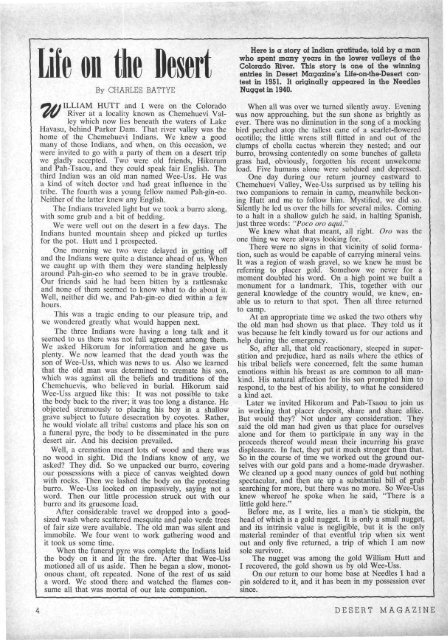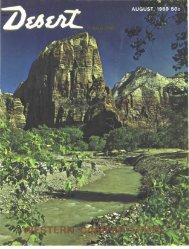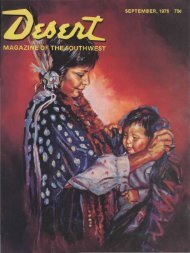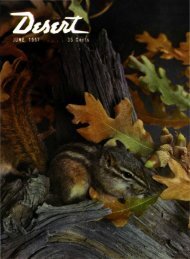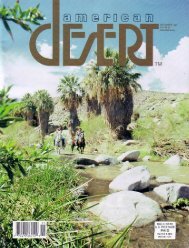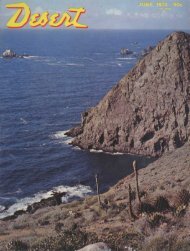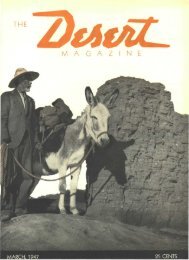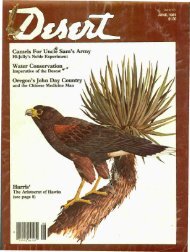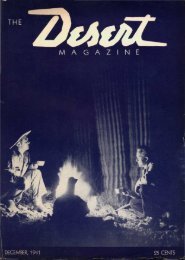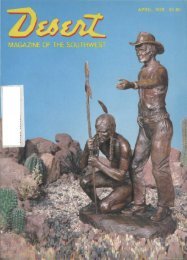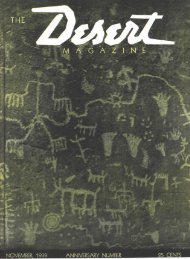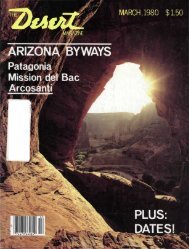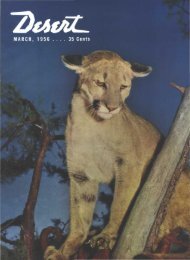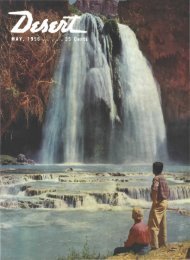desert calendar - Desert Magazine of the Southwest
desert calendar - Desert Magazine of the Southwest
desert calendar - Desert Magazine of the Southwest
Create successful ePaper yourself
Turn your PDF publications into a flip-book with our unique Google optimized e-Paper software.
Life on <strong>the</strong> <strong>Desert</strong><br />
By CHARLES BATTYE<br />
02/jlLLIAM HUTT and I were on <strong>the</strong> Colorado<br />
£/(/ River at a locality known as Chemehuevi Valley<br />
which now lies beneath <strong>the</strong> waters <strong>of</strong> Lake<br />
Havasu, behind Parker Dam. That river valley was <strong>the</strong><br />
home <strong>of</strong> <strong>the</strong> Chemehuevi Indians. We knew a good<br />
many <strong>of</strong> those Indians, and when, on this occasion, we<br />
were invited to go with a party <strong>of</strong> <strong>the</strong>m on a <strong>desert</strong> trip<br />
we gladly accepted. Two were old friends, Hikorum<br />
and Pah-Tsaou, and <strong>the</strong>y could speak fair English. The<br />
third Indian was an old man named Wee-Uss. He was<br />
a kind <strong>of</strong> witch doctor and had great influence in <strong>the</strong><br />
tribe. The fourth was a young fellow named Pah-gin-eo.<br />
Nei<strong>the</strong>r <strong>of</strong> <strong>the</strong> latter knew any English.<br />
The Indians traveled light but we took a burro along,<br />
with some grub and a bit <strong>of</strong> bedding.<br />
We were well out on <strong>the</strong> <strong>desert</strong> in a few days. The<br />
Indians hunted mountain sheep and picked up turtles<br />
for <strong>the</strong> pot. Hutt and I prospected.<br />
One morning we two were delayed in getting <strong>of</strong>f<br />
and <strong>the</strong> Indians were quite a distance ahead <strong>of</strong> us. When<br />
we caught up with <strong>the</strong>m <strong>the</strong>y were standing helplessly<br />
around Pah-gin-eo who seemed to be in grave trouble.<br />
Our friends said he had been bitten by a rattlesnake<br />
and none <strong>of</strong> <strong>the</strong>m seemed to know what to do about it.<br />
Well, nei<strong>the</strong>r did we, and Pah-gin-eo died within a few<br />
hours.<br />
This was a tragic ending to our pleasure trip, and<br />
we wondered greatly what would happen next.<br />
The three Indians were having a long talk and it<br />
seemed to us <strong>the</strong>re was not full agreement among <strong>the</strong>m.<br />
We asked Hikorum for information and he gave us<br />
plenty. We now learned that <strong>the</strong> dead youth was <strong>the</strong><br />
son <strong>of</strong> Wee-Uss, which was news to us. Also we learned<br />
that <strong>the</strong> old man was determined to cremate his son,<br />
which was against all <strong>the</strong> beliefs and traditions <strong>of</strong> <strong>the</strong><br />
Chemehuevis, who believed in burial. Hikorum said<br />
Wee-Uss argued like this: It was not possible to take<br />
<strong>the</strong> body back to <strong>the</strong> river; it was too long a distance. He<br />
objected strenuously to placing his boy in a shallow<br />
grave subject to future desecration by coyotes. Ra<strong>the</strong>r,<br />
he would violate all tribal customs and place his son on<br />
a funeral pyre, <strong>the</strong> body to be disseminated in <strong>the</strong> pure<br />
<strong>desert</strong> air. And his decision prevailed.<br />
Well, a cremation meant lots <strong>of</strong> wood and <strong>the</strong>re was<br />
no wood in sight. Did <strong>the</strong> Indians know <strong>of</strong> any, we<br />
asked? They did. So we unpacked our burro, covering<br />
our possessions with a piece <strong>of</strong> canvas weighted down<br />
with rocks. Then we lashed <strong>the</strong> body on <strong>the</strong> protesting<br />
burro. Wee-Uss looked on impassively, saying not a<br />
word. Then our little procession struck out with our<br />
burro and its gruesome load.<br />
After considerable travel we dropped into a goodsized<br />
wash where scattered mesquite and palo verde trees<br />
<strong>of</strong> fair size were available. The old man was silent and<br />
immobile. We four went to work ga<strong>the</strong>ring wood and<br />
it took us some time.<br />
When <strong>the</strong> funeral pyre was complete <strong>the</strong> Indians laid<br />
<strong>the</strong> body on it and lit <strong>the</strong> fire. After that Wee-Uss<br />
motioned all <strong>of</strong> us aside. Then he began a slow, monotonous<br />
chant, <strong>of</strong>t repeated. None <strong>of</strong> <strong>the</strong> rest <strong>of</strong> us said<br />
a word. We stood <strong>the</strong>re and watched <strong>the</strong> flames consume<br />
all that was mortal <strong>of</strong> our late companion.<br />
Here is a story <strong>of</strong> Indian gratitude, told by a man<br />
who spent many years in <strong>the</strong> lower valleys <strong>of</strong> <strong>the</strong><br />
Colorado River. This story is one <strong>of</strong> <strong>the</strong> winning<br />
entries in <strong>Desert</strong> <strong>Magazine</strong>'s Life-on-<strong>the</strong>-<strong>Desert</strong> contest<br />
in 1951. It originally appeared in <strong>the</strong> Needles<br />
Nugget in 1940.<br />
When all was over we turned silently away. Evening<br />
was now approaching, but <strong>the</strong> sun shone as brightly as<br />
ever. There was no diminution in <strong>the</strong> song <strong>of</strong> a mocking<br />
bird perched atop <strong>the</strong> tallest cane <strong>of</strong> a scarlet-flowered<br />
ocotillo; <strong>the</strong> little wrens still flitted in and out <strong>of</strong> <strong>the</strong><br />
clumps <strong>of</strong> cholla cactus wherein <strong>the</strong>y nested; and our<br />
burro, browsing contentedly on some bunches <strong>of</strong> galleta<br />
grass had, obviously, forgotten his recent unwelcome<br />
load. Five humans alone were subdued and depressed.<br />
One day during our return journey eastward to<br />
Chemehuevi Valley, Wee-Uss surprised us by telling his<br />
two companions to remain in camp, meanwhile beckoning<br />
Hutt and me to follow him. Mystified, we did so.<br />
Silently he led us over <strong>the</strong> hills for several miles. Coming<br />
to a halt in a shallow gulch he said, in halting Spanish,<br />
just three words: "Poco oro aqui."<br />
We knew what that meant, all right. Oro was <strong>the</strong><br />
one thing we were always looking for.<br />
There were no signs in that vicinity <strong>of</strong> solid formation,<br />
such as would be capable <strong>of</strong> carrying mineral veins.<br />
It was a region <strong>of</strong> wash gravel, so we knew he must be<br />
referring to placer gold. Somehow we never for a<br />
moment doubted his word. On a high point we built a<br />
monument for a landmark. This, toge<strong>the</strong>r with our<br />
general knowledge <strong>of</strong> <strong>the</strong> country would, we knew, enable<br />
us to return to that spot. Then all three returned<br />
to camp.<br />
At an appropriate time we asked <strong>the</strong> two o<strong>the</strong>rs why<br />
<strong>the</strong> old man had shown us that place. They told us it<br />
was because he felt kindly toward us for our actions and<br />
help during <strong>the</strong> emergency.<br />
So, after all, that old reactionary, steeped in superstition<br />
and prejudice, hard as nails where <strong>the</strong> ethics <strong>of</strong><br />
his tribal beliefs were concerned, felt <strong>the</strong> same human<br />
emotions within his breast as are common to all mankind.<br />
His natural affection for his son prompted him to<br />
respond, to <strong>the</strong> best <strong>of</strong> his ability, to what he considered<br />
a kind act.<br />
Later we invited Hikorum and Pah-Tsaou to join us<br />
in working that placer deposit, share and share alike.<br />
But would <strong>the</strong>y? Not under any consideration. They<br />
said <strong>the</strong> old man had given us that place for ourselves<br />
alone and for <strong>the</strong>m to participate in any way in <strong>the</strong><br />
proceeds <strong>the</strong>re<strong>of</strong> would mean <strong>the</strong>ir incurring his grave<br />
displeasure. In fact, <strong>the</strong>y put it much stronger than that.<br />
So in <strong>the</strong> course <strong>of</strong> time we worked out <strong>the</strong> ground ourselves<br />
with our gold pans and a home-made drywasher.<br />
We cleaned up a good many ounces <strong>of</strong> gold but nothing<br />
spectacular, and <strong>the</strong>n ate up a substantial bill <strong>of</strong> grub<br />
searching for more, but <strong>the</strong>re was no more. So Wee-Uss<br />
knew where<strong>of</strong> he spoke when he said, "There is a<br />
little gold here."<br />
Before me, as I write, lies a man's tie stickpin, <strong>the</strong><br />
head <strong>of</strong> which is a gold nugget. It is only a small nugget,<br />
and its intrinsic value is negligible, but it is <strong>the</strong> only<br />
material reminder <strong>of</strong> that eventful trip when six went<br />
out and only five returned, a trip <strong>of</strong> which I am now<br />
sole survivor.<br />
The nugget was among <strong>the</strong> gold William Hutt and<br />
I recovered, <strong>the</strong> gold shown us by old Wee-Uss.<br />
On our return to our home base at Needles I had a<br />
pin soldered to it, and it has been in my possession ever<br />
since.<br />
DESERT MAGAZINE


